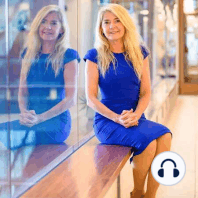21 min listen

Episode #17. EVERYONE wants to be SEEN. My Hope to Recharge podcast interview about trauma and brain development with Matana Poupko Jacobs.
Episode #17. EVERYONE wants to be SEEN. My Hope to Recharge podcast interview about trauma and brain development with Matana Poupko Jacobs.
ratings:
Length:
64 minutes
Released:
Sep 29, 2019
Format:
Podcast episode
Description
From the Hope to Recharge Podcast with Matana Poupko Jacobs.Brain health from a Neuroscientist’s mind and heart.Prof. Selena Bartlett. She was raised, studied and worked for many years in Australia and then made a career change which led her to the western shores of the United States. Originally a pharmacist Selena spent many years developing drugs to treat illnesses.In 1989 her younger sister, Francesca, had a traumatic mental episode and was hospitalized. Selena went to visit her sister daily during her stay in the hospital. Due to the severe and harsh treatment Francesca underwent, Selena was moved to delve into mental health.Little was known about the machinations of the brain when she began her research. In 1995 she received her Ph.D. in neuropharmacology. In 2004 she moved to the University of California at San Francisco where she directed research in alcohol and addiction for eight years. This led Prof. Bartlett to create treatments for neurological problems such as addiction, pain, stress, anxiety and depression. She most recently has been busy presenting her findings on brain fitness and neuroplasticity, the ability to restructure and realign the brain.I met Prof. Bartlett a year ago. What had brought us together was a mutual passion to remove the stigma revolving mental illness. Selena explained that we have inherited genes from our parents and grandparents and great grandparents that have within them a history that we cannot rewrite.What we can do is draw a line in the sand and say - from now on I want to make changes. Changes can be made. The method is simple but not easy.If it was easy, Selena explains, none of us would be dealing with anxiety, depression, or addictions.If a person has an anxious day we are likely to come home pour ourselves a drink as we make supper, and then perhaps another one or two. We can retrain ourselves to react differently to the stimuli of an anxious day. Replace the drink with a walk around the block or sitting, relaxing under the shade of a tree. It can be done. It works. We just need to make the switch.The blockage to this is our instinct to stay with the known, with our habits.Even if we are convinced that the change is to our benefit, habit rules with a heavy hand.Another area where we can create positive change is in giving our children attention and love. Selena points to the time period between 0 and 3 and 10 to 14 years of age as being hyper-important to receive loving attention.A person who has it will grow up with a healthier mental state and be more capable of dealing with the hand that life deals them. Even if it isn’t a winning hand. In contrast someone who didn’t receive the all important love and attention in their crucial formative years is much more likely as they age to fall prey to mental illness. Genes are 60% of the story, but don’t discount the 40% of parental input. It can tip the balance between dealing with issues and dealing with addictions.Support the showLearn more at www.profselenabartlett.com
Released:
Sep 29, 2019
Format:
Podcast episode
Titles in the series (100)
Episode #22. Sugar Countess. Maria Bernard from the Heart Foundation on counting sugar intake. by THRIVING MINDS PODCAST